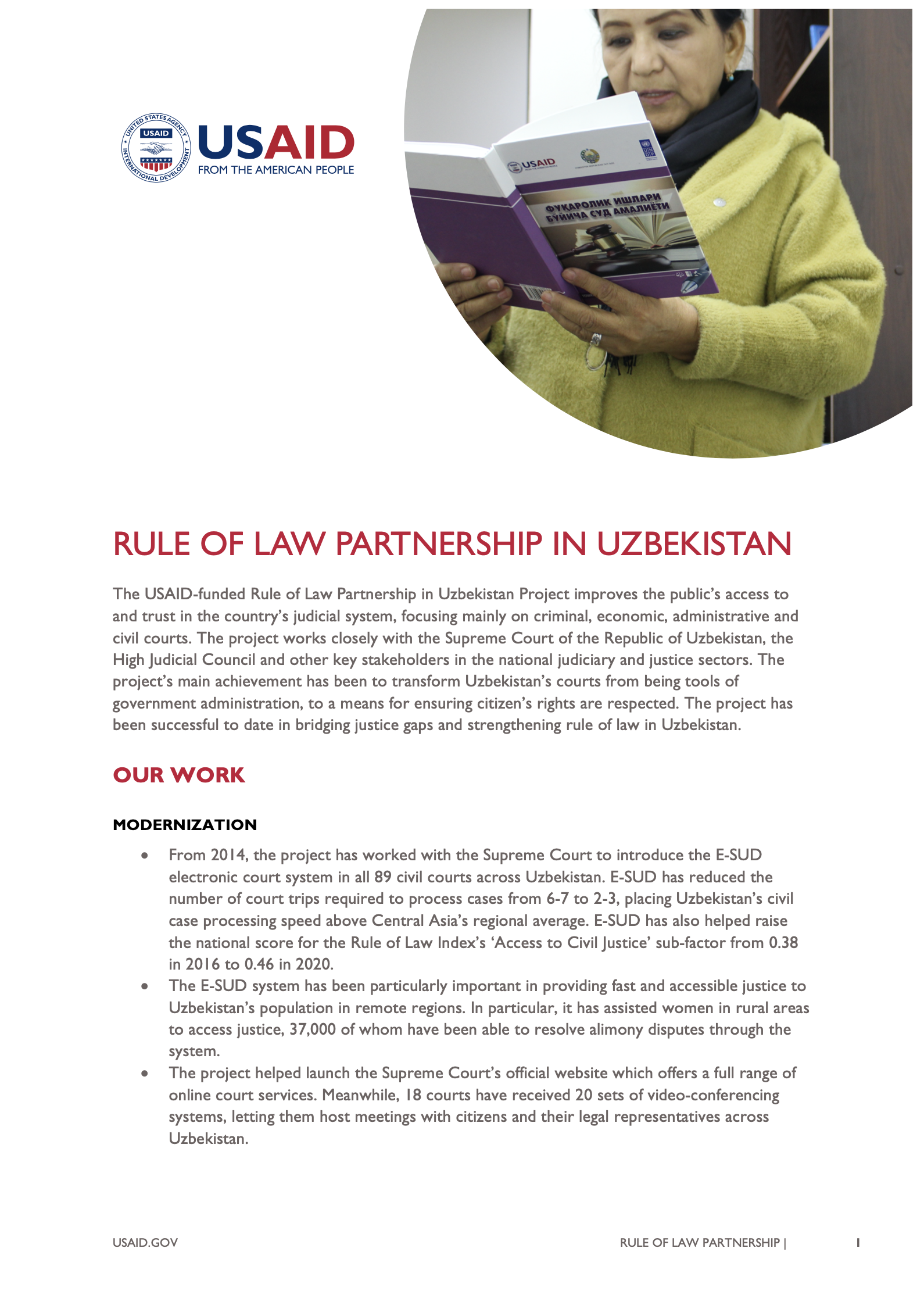Speeches Shim
Rule of Law Partnership In Uzbekistan ![]() (pdf - 6 MB)
(pdf - 6 MB)
The USAID-funded Rule of Law Partnership in Uzbekistan Project improves the public’s access to and trust in the country’s judicial system, focusing mainly on criminal, economic, administrative and civil courts. The project works closely with the Supreme Court of the Republic of Uzbekistan, the High Judicial Council and other key stakeholders in the national judiciary and justice sectors. The project’s main achievement has been to transform Uzbekistan’s courts from being tools of government administration, to a means for ensuring citizen’s rights are respected. The project has been successful to date in bridging justice gaps and strengthening rule of law in Uzbekistan.
OUR WORK
MODERNIZATION
- From 2014, the project has worked with the Supreme Court to introduce the E-SUD electronic court system in all 89 civil courts across Uzbekistan. E-SUD has reduced the number of court trips required to process cases from 6-7 to 2-3, placing Uzbekistan’s civil case processing speed above Central Asia’s regional average. E-SUD has also helped raise the national score for the Rule of Law Index’s ‘Access to Civil Justice’ sub-factor from 0.38 in 2016 to 0.46 in 2020.
- The E-SUD system has been particularly important in providing fast and accessible justice to Uzbekistan’s population in remote regions. In particular, it has assisted women in rural areas to access justice, 37,000 of whom have been able to resolve alimony disputes through the system.
- The project helped launch the Supreme Court’s official website which offers a full range of online court services. Meanwhile, 18 courts have received 20 sets of video-conferencing systems, letting them host meetings with citizens and their legal representatives across Uzbekistan.
TRAINING & INSTITUTION DEVELOPMENT
- The project has given vital assistance to the Tashkent State University of Law’s free Legal Clinic, providing personal computers and training student clinicians and their instructors. Meanwhile, free legal services have been piloted with the project’s help in criminal, administrative and civil courts. All this ensures Uzbekistan’s low-income citizens can access legal help whenever they need it.
- The project has helped the Supreme Court implement broad judicial reforms, drawn from best international experience. In particular, this resulted in Uzbekistan’s rankings in the Doing Business Index’s ‘Enforcement of Contracts’ sub-index to increase from the 41st position in 2019 to 22nd in 2020.
- The project drafted the Law on Mediation in 2017, and subsequently organized trainings for mediators in 2019, creating a precedent for future mediator training programs. Mediation has become an additional means of resolving legal conflicts in Uzbekistan. Its establishment has boosted Uzbekistan’s position on the ‘Accessible, Impartial and Effective ADR’ (Alternative Dispute Resolution) sub-factor of the World Justice Project Rule of Law index from 0.58 in 2016 to 0.67 in 2020. This represents a jump from 87th to 55th position globally.
- The project established an information resource center, library and website for the Supreme School of Judges under the Supreme Judicial Council of Uzbekistan. These resources have helped students improve their knowledge on the procedural legislation of Uzbekistan and skills required to effectively deliver justice in line with best international standards.
TRANSPARENCY
- The project has collaborated with Uzbekistan’s courts to make improving their transparency a priority, thereby strengthening public confidence in their operation and objectivity. Courts have organized open days and Q&A sessions, and have given practical information to citizens about legal concerns often faced in everyday life.
- The project has helped make court operations more transparent by improving judicial appointment processes, with related recommendations included in the State Anti-Corruption Program of 2019-2020. Also, amendments to Uzbekistan’s blind (automatic) case distribution legislation was introduced on March 10, 2020. Both these actions have strengthened the judicial independence of courts in Uzbekistan.
- The project has helped to build collaboration and trust between the judiciary and journalists by organizing press tours to Uzbekistan’s regional courts, while also sharing best international practices in court-journalist relations. These efforts have improved public awareness of how courts operate, and citizen’s trust that courts function primarily to meet their needs.
- The project has developed 30 simple publications to enhance the legal literacy of Uzbekistan’s citizens. The manuals and brochures cover common causes of legal concern, such as inheritance and marriage law, along with how to apply to courts and appeal court decisions. They are designed to be practical and easily understood.


Comment
Make a general inquiry or suggest an improvement.